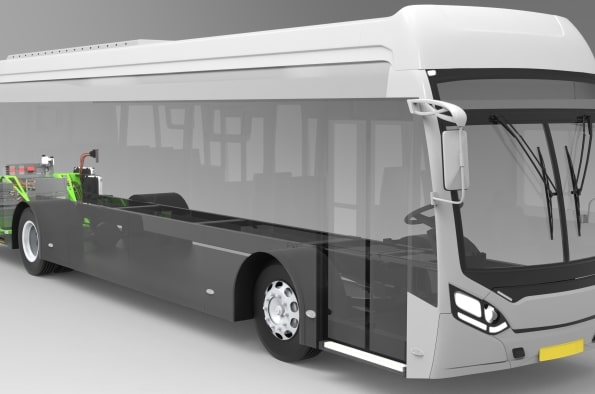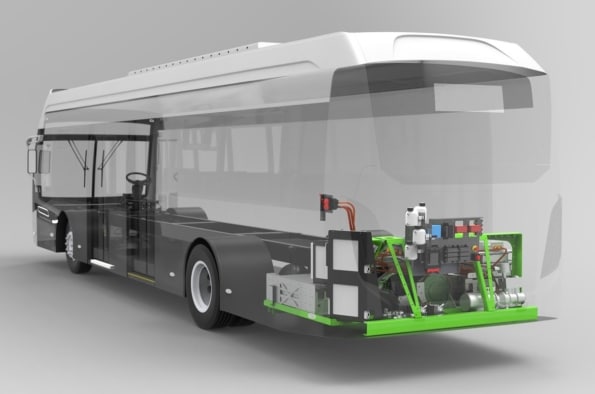Expert bus repower company Kleanbus has revealed first images of its advanced modular platform technology, which can turn any bus, whether single or double decker, from ICE to fully electric quickly and cost-effectively.
With climate change escalating and poor air quality in cities reaching critical levels, decarbonising transport has become one of the greatest challenges of our time. Electrification is the most viable way for bus operators to go green, but new electric buses are expensive and can take many months to join a fleet from order placement to delivery.
Repowering – removing the diesel engine or hybrid powertrain from an existing bus, replacing it with a fully electric powertrain – is the fastest and most cost-effective method to transition the UK bus fleet to zero emission, and Kleanbus’ advanced solution can accelerate that changeover thanks to the company’s unique technology.

Joe Tighe, Co-Founder and CEO of Kleanbus said:“With 97% of UK buses powered by diesel engines that emit large amounts of carbon, oxides of nitrogen, and particulate matter – and a staggering 35,000 of them on the road – the country faces a major challenge to rapidly decarbonise this vital transport sector and is struggling to move quickly enough*.
“Replacing these vehicles with new electric buses is very expensive for private companies and government subsidies will take many years given fleet turnover rates. Kleanbus offers a fast and efficient way towards zero-emissions, making buses cleaner, quieter, more comfortable, and more valuable assets for operators.”
Combining proven and fully warranted electric powertrain components from leading Tier 1 suppliers with Kleanbus’ own integration technology and proprietary software, Kleanbus’ platform system is technology agnostic, nimble and adaptable. This innovative approach means that Kleanbus can take advantage of the very latest componentry, enabling it to leverage a wide variety of batteries and motors, creating purpose-built e-powertrains tailored exactly to a bus operator’s needs.
The e-motors used by Kleanbus also do not have permanent magnets, so use no rare earth materials at all, demanding less of the planet’s resources and limiting the disastrous impact of rare earth metals production.
From its state-of-the-art 9,000 sq ft facility based in the east of England, the Kleanbus repower programme consists of a full evaluation of the vehicle, removal of its diesel engine and all associated ICE components, scanning and prototyping of the vehicle’s interior, design of a bespoke platform, installation of a new e-drive, build, full testing process and final certification.
Once a bespoke e-drivetrain has been designed and tested it takes less than two weeks to repower an individual bus, getting the vehicle back in service in as little time as possible.
Operating costs are also dramatically lower, at a third of those of a conventional diesel bus, likely to be even greater with the latest new Bus Service Operators Grant (BSOG) Zero Emission Bus (ZEB) incentive of 22 pence per kilometre, factored in.
Electric repowered buses from Kleanbus also cost one fifth of a new electric bus – but thanks to Kleanbus’ partnerships with innovative finance providers, operators can choose several ways in which to finance their vehicle, ranging from paying for the vehicle upfront and leasing the battery, to paying nothing upfront and leasing both the vehicle and the battery. In this way, operators can fund the cost of the repower through operating revenue, maximising the business case.
And thanks to the company’s relationships with charging providers, Kleanbus also arranges for an operator’s depot to be upgraded with appropriate charging technology, enabling them to go electric without having to contact third parties, effectively offering a one-stop shop.
Joe added:“I am delighted to reveal first images of our modular repower platform system, which can be applied to any bus. Leveraging the latest in fully warranted and proven components from leading Tier 1s, this technology agnostic solution enables us to create a flexible ‘e-drivetrain in a box’, integrated into any vehicle via our own proprietary software. I am hugely proud of our innovative system, but Kleanbus is more than a technology company, we provide a full one-stop-shop to bus operators, with innovative financing and charging as part of the total package, making it easy for them to go zero emission. The potential for repowered buses is huge. They could bring about fully electric bus fleets six years earlier than relying on roll out of new zero emission buses alone. This could give a potential saving of over 4Mt CO2 and deliver health benefits of improved air quality sooner – and Kleanbus can play a crucial role in accelerating the transition to a clean future while providing lower operating costs for bus fleets.”



